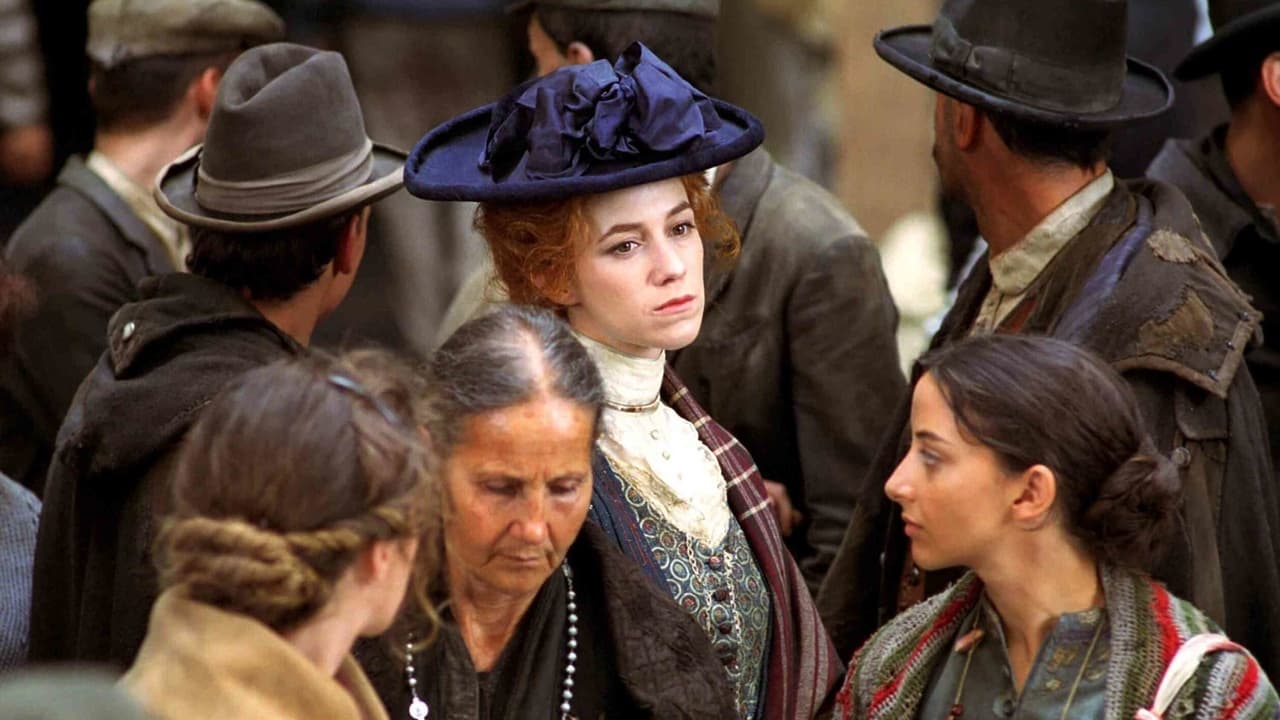Linbeymusol
Wonderful character development!
AnhartLinkin
This story has more twists and turns than a second-rate soap opera.
Ezmae Chang
This is a small, humorous movie in some ways, but it has a huge heart. What a nice experience.
Justina
The film never slows down or bores, plunging from one harrowing sequence to the next.
dallas_viewer
***POSSIBLE SPOILERS BELOW*** What a long and mostly uninteresting movie! Who were these characters? Why didn't I care about them? If I'm going to watch a movie for two hours, I'd like to care about somebody or something. We know that Salvatore dreamed of the riches to be found in the new world. Beyond that, though, we learned little about most of his family's hopes, fears, etc., as they embarked on an adventure into the unknown.And why was Lucy even in this movie? She said little; we knew little about her or what she was doing (was she forced to service men in exchange for being allowed to board the ship?) or what her plans were upon reaching New York. To those who might suggest that she was needed to underscore the point that a single woman, however cultured, could not get into this country alone, I say that that fact is not enough justification to give her so much screen time. That point could have been made in five minutes, with Lucy as a momentary character.More questions: Why wasn't the twin brother at the boat to meet the family? We heard about the brother, and some closure on that point would have been helpful in giving the movie some cohesiveness. Also, how long was the journey from Italy to New York? Given the conditions on the ship, it makes a difference to the viewer if the voyage took five or 10 or 50 days. (Someone said something about seeing land a "week" at one point, but I think that was when they were already en route.) I needed these types of details to better appreciate what they were going through.The only scene I really liked was when the boat, filled with passengers, left the dock. If you choose to rent this movie, do so with remote in hand; you may want the Fast Forward button handy.Finally, may I suggest that, with the right voice-over providing helpful information about the times and the circumstances for immigrants--particularly during the slow stretches of endless shots of the countryside, people walking, etc.--this movie might have made an interesting public TV documentary.
jdesando
So now I have a very good idea what my immigrant grandparents went through traveling by boat from Italy and through Ellis Island aka "Golden Door" in the early part of the twentieth century. Emanuel Crialese's Golden Door amply describes the primitive living circumstances that motivate these adventurers to leave home, the cramped weeks aboard a steamer, and the indignities. In fact, the director is so precise that most of the tale lumbers through the details of living and then processing at the island to the detriment of engaging story telling.The only relief from the boredom (like the voyage) is the occasional Fellini-like impressionism: One prominently has characters swimming in milk (as in the "land of milk and honey") more than once. It could be argued that the director doesn't prepare the audience for the abrupt transitions into the formalist episodes, but I felt relief with them.By contrast Mira Nair's recent Namesake is superior in telling an interesting story about identity and the new world, and Chaplin's Immigrant (1917) makes the boat ride a model of slapstick and the restaurant scene not only humorous but telling about the challenges immigrants inevitably face. Nobody ever said Chaplin was boring.Charlotte Gainsbourg stands out as Lucy, a husband-seeking Brit whose literate background makes her useful, and whose role as a strong, beautiful woman allows the film to explore the prejudices against women. She is unforgettable when she and other women sit in a room awaiting the magistrate's permission to marry a man often the woman is meeting for the first time. That a woman would need a man to qualify for entry into America may not be so anachronistic given Hilary needing Bill to make her political career in the twenty first century.Agnes Godard's cinematography is often the salvation of a scene, for instance when she catches two mountain climbers with rocks in their mouths deftly negotiating a rock-strewn hill top to arrive at a shrine. Mostly she photographs the climbers close up to keep the adventurous sense of surprise. Then she reduces them to just more rubble as she pulls back into a major bird's eye view losing them slowly just as their journey across the Atlantic will reduce them again.It's a slow journey.
Cliff Hanley
Stranger things have happened than the director of 'Respiro' seeing the well-worn and much-loved opening credits sequence for Monty Python, and allowing his memory to resurface in the opening of this epic as two young men, now in close-up, now tiny and lost in the aerial microcosmic pattern of hill rocks, pieces of stone jammed in their bleeding mouths, struggle to the holy cairn at the top to ask a vital question. Simultaneously two girls, bearing promises of marriage to (perhaps) rich foreigners and photos of giant vegetables and American streets paved with gold, are persuaded to throw the photos away; the pictures are taken by a dumb lad to the cairn just as the eldest, Salvatore (Amato), begs the Gods to tell "us" if "we" should stay, or leave. Salvatore, his family, which gradually grows as the story opens out, are joined by a lost and rootless English lady (Gainsbourg) who decides to join the family if she can, to gain entry into the Promised Land. The story right from the start looks like a coat hanger for the visuals, and it is a treat throughout for the eyes. The great break as the ship leaves home is handled in a completely unconventional way: A God's-eye view shows the heads on board and the heads remaining on shore slowly separating as the ship moves out, as if the crowd is a 'people cake' that has been sliced. The sheer brutality of the situation these people have to live through is leavened by this kind of camera-work, and by the occasional magic dream, as when the no-longer brooding Salvatore's face is showered by coins. The tensions, though, coming out of the struggle to leave the Old Country, survive the voyage and pass into the New Country, and the simple efforts of strangers to cope with each other, keep it fascinating. Whenever Aurora Quattrocchi, 'Mama', is on screen, it seems to shift round to her point of view, yet another layer. The episodic structure, too, adds to the illusion of it's being shorter than it is. There are as many apparent links to the coming century as to the past here - the scenes on the mountain look like Pasolini, and the three males could almost have been the Marx BrothersAfter the nightmare of travelling 'steerage', a storm in mid-Atlantic and the interminable and humiliating selection process and 'aptitude' tests at Ellis Island (lack of intelligence has been scientifically proved to be genetically inherited, and we do not want these people amongst our citizens), it remains ambiguous whether everyone has got through to the Land of Milk and Honey, or the Mean Streets. I would say on the strength of this, that if anyone has the guts to put up the money for a film of 100 Years of Solitude, Crialese must be your man. CLIFF HANLEY
lauralmhs
The Golden Door is the story of the Mancuso family's journey to America at the turn of the last century. The movie can be thought of in three distinct segments: the life the immigrants left behind in "the old country," the Atlantic passage to America, and the processing through Ellis Island.The opening scenes, although they take place a mere 100 or so years ago, conjure up the Dark Ages. For all the superstition, illiteracy and darkness that pervaded peasant life in Italy at that time, it might very well have been that era.Once the family decides to depart (only after receiving a "sign" from a saint to whom the patriarch prays), the horrendous conditions in steerage make it hard to imagine that these poor souls took on this voyage voluntarily. But they went. They went seeking out a life in a new land where money grows on trees and rivers run with milk (two of the more surreal themes in the movie).The processing on Ellis Island – which could end in forced return to the old country – included every kind of indignity, including communal showers, medical exams en massed, intelligence testing that today would be denounced as "culturally biased," and brokered engagements held in an almost auction-like public setting. When it is inquired why all this is necessary, it is pronounced that America does not want the taint of inferior people.Running as a subplot to the story of the Mancuso family is the story of Salvatore Mancuso and Lucy Reed, an English gentlewoman on board the ship who proposes to him as a means of gaining her admission to America where sponsorship is required of immigrant women. Although she claims that this will be nothing more than a marriage of convenience (and "not for love"), her eyes tell a different story, whereas Salvatore is clearly smitten with her.This is a gritty and richly detailed movie. One scene where an elderly grandmother holds her grandson's hands in hers focuses on the dirt embedded under their finger nails.The soundtrack is great, although not appropriate to time or place, alternating between too modern (the music playing over the credits) and more Middle Eastern-sounding than Italian (the folk music played by the immigrants while on board ship).To witness the hardships that our forebears forbore to pass through "the golden door" is to be jolted out of our American complacency and to appreciate what they endured to pave the way for the lives we enjoy today.Laura L.

